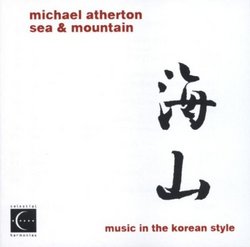| All Artists: Michael Atherton Title: Sea & Mountain: Music in the Korean Style Members Wishing: 0 Total Copies: 0 Label: Celestial Harmonies Release Date: 4/1/2003 Genres: International Music, New Age, Pop Style: Far East & Asia Number of Discs: 1 SwapaCD Credits: 1 UPC: 013711317022 |
Search - Michael Atherton :: Sea & Mountain: Music in the Korean Style
 | Michael Atherton Sea & Mountain: Music in the Korean Style Genres: International Music, New Age, Pop
As an Australian living in a unique multicultural society, I am privileged to count Korean-Australians among my friends and to have traveled to Korea on several occasions as a performer. I enjoy Korea, its music and the... more » |
Larger Image |
CD Details
Synopsis
Album Description
As an Australian living in a unique multicultural society, I am privileged to count Korean-Australians among my friends and to have traveled to Korea on several occasions as a performer. I enjoy Korea, its music and the liveliness of the Korean people, and welcome the day when the country might become united again.In creating this musical project, it was inevitable that I would want to express something of my passion for Korea's rich musical heritage, not simply through copying or emulation, but to allow for melodies, rhythms and timbres to permeate my own musical background, through an osmotic process. The result is a mostly improvised and spontaneously created collection of pieces.I acknowledge respectfully, Korean cultural identity and values, and the many wonderful composer-musicians I have been privileged to listen to and meet on my travels. Included are Hwang Byung-ki (kayagum/zither), Kim Duk-Soo (samul nori/percussion), Won Jang-Hyun (taegum/flute), and An Sook-Su (pansori). Each is a master, an intangible asset to Korea's rich cultural life, yet mostly unknown to Western audiences in stark contrast with a growing number of Korean virtuosi working in the canons of European classical music.The instrumental palette on this CD is broad. Some of the instruments are Korean and some of the combinations reflect Korean practices. For example, track 4 The Singer of Tales is influenced by pansori - an extended musical narrative performed by a singer accompanied by a small double-headed barrel drum (puk). Lovesong 1 and Lovesong 2 are based on minyo, traditional folk-songs heard in the cities of Seoul and Kyongju.The free improvisations on the zither and the guitar heard on A Poet's Longing and A Monk Reflects allude to the sanjo tradition. Sanjo might be described as `scattered melodies'. It is a solo form devoted to virtuosic performances on a melodic instrument accompanied by the changgo, an hour-glass drum.Michael Atherton

 Track Listings (14) - Disc #1
Track Listings (14) - Disc #1